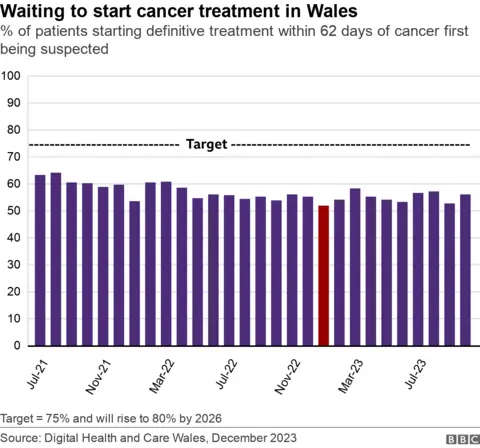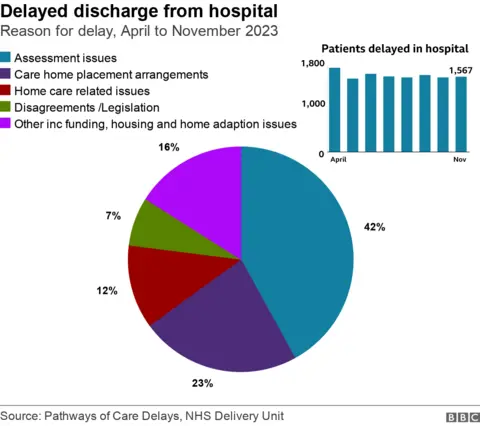NHS Wales: Hospital waiting times continue to rise
 BBC
BBCHospital waiting times have hit record levels again in Wales.
Latest figures show improvements in ambulance, A&E and cancer waiting times.
But the numbers waiting to start treatment rose to just under 764,500 in October - a rise for an eighth consecutive month.
Because some patients are on more than one waiting list, the actual number of patients waiting was estimated to be 596,000 - another record.
Health Minister Eluned Morgan said: "We have placed a clear focus on tackling both those patients with an urgent need and those that have waited the longest.
"We have continued to see the number of patients waiting over two years fall - down by 64% since its peak."
Ms Morgan added: "We have built on learning from last winter and put in place a number of measures to increase our resilience this year. "
"These include 119 more ambulance staff than last year, and more staff available to respond to calls to the NHS 111 Wales service - which continues to help tens of thousands of people to receive urgent health advice, both online and over the telephone, 24 hours a day seven days a week."
What about those waiting the longest?
There were 134,456 patients waiting more than a year - slightly more than a month ago.
We can adjust these figures - counting only consultant-led specialisms - which enables us to compare with England.
A total of 19.6% of waits on consultant-led specialisms were more than a year in Wales, compared to 4.9% in England.
When we look at a region of England with similar socio-economic characteristics, north-east England, then only 2.3% of waits across nine health trusts were more than a year.
For the longest waits - two years or more - this accounted for 3.7% of all waits in Wales and just 0.002% in England - only 190 patient pathways in England.
The number waiting two years hit more than 70,400 in March last year and has been reducing since, by about 2-3% a month since the summer but is still 25,569.
There is a plan to eliminate two-year waits in selected specialties by March 2023 but this remains unmet, with 3,200 still on that list.
For the ambulance service, 49.5% of "red" calls received an emergency response within eight minutes - an improvement on the previous month. This was during a month which saw the second highest number of red calls on record.
The average response time to these was eight minutes four seconds, which was 22 seconds quicker than the previous month, and 14 seconds faster than this time last year.
For A&E waiting times, there was an improvement over the month, with 69.5% spending less than four hours before being treated, admitted or discharged.
It dropped to 45% at Glan Clwyd Hospital, in the Betsi Cadwaladr health board area.
When just major emergency units are compared with England, then Wales has performed better comparatively for the last three months.
There were 8,622 patients waiting more than 12 hours, when the target is that no-one should wait that long.
The average waiting time was two hours and 41 minutes, more than eight minutes quicker than the previous month.
Meanwhile, there were 19,857 "lost hours" - the time ambulances spent outside A&E waiting to hand over patients beyond a 15-minute window. This was slightly better than the average for this year.

Cancer waiting times improved over the month but were still below target.
Just over 56% of patients started treatment within 62 days of cancer being first suspected. Health board areas like Cwm Taf Morgannwg, Hywel Dda and Swansea Bay have been below the Welsh average for this target for months.
Glenn Page, Macmillan policy manager for Wales, said: "While any improvement in cancer treatment waiting times in Wales must be welcomed, far too many people with cancer are still waiting far too long for their treatment to begin."
There are continued difficulties in meeting another post-pandemic recovery target - that no-one should wait a year for a first outpatients appointment.
That figure has stubbornly been around 50,000 patients for the last eight months and rose to 52,172 in October.
Swansea Bay has managed to eliminate all its one-year waits but there are still more than 12,800 outpatients waiting more than a year in Cwm Taf Morgannwg.
Meanwhile, numbers waiting for diagnostics reached record levels - 120,800 patient pathways.
Conservatives called the figures "atrocious".
Health spokesman Russell George said: "I am urging Labour ministers to park plans for more politicians and constitutional tinkering so that Wales can see a fully resourced health service".
Plaid Cymru's Mabon ap Gwynfor said the plan to cut waiting times had been a "dismal failure".
He said the party had continuously called for a "prevention revolution" to get to grips with the chronic issues plaguing the NHS.

Figures also show more than 1,560 patients in hospital who were medically fit to be discharged who were still there, because of delays in getting social care or a residential home place. More than 500 of these were patients waiting for assessments.
The Royal College of Surgeons said that this "bottleneck" was also having an impact on waiting times, as well as placing patients at risk of infections or deterioration whilst awaiting discharge.
The NHS Confederation, which represents health boards in Wales, said the latest waiting times figures were a mixed picture and showed the immense level of demand.
"I'd ask politicians in Cardiff and Westminster to stop the playing the political blame game, demand is at historically high levels across the UK in a very challenging financial situation," said director Darren Hughes.
"Staff are working tirelessly to give people the best care. The challenges in social care are still having a disproportionate impact on our ability to discharge patients."

Extra cash may have been set aside for the health service from this week's draft budget, but the sting in the tail is it won't go far.
So much is being soaked up by inflationary costs that it simply allows the minister to "keep the show on the road".
As fresh figures show the demand facing the service as it heads towards its busiest part of the year, Eluned Morgan told BBC Wales that we need "significant change in the way we do things" but that's hindered by the budget realities.
Hopes of innovation are dashed as purse strings are tightened and the NHS holds its breath for a winter that's less punishing than the last.
And while today's figures contain glimmers of hope, a looming junior doctors' strike next month means building on that will be a challenge.
In a year that has been book-ended by strike talks, even the measures put in place have done little to move the dial for a service under great strain.
